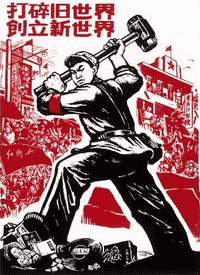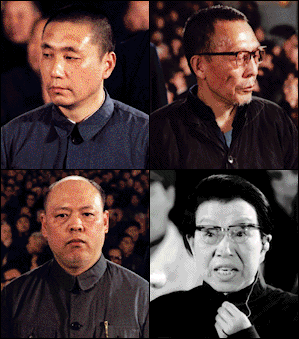1. Big-Character poster: Are handwritten, wall-mounted posters using large-sized Chinese characters, used as a means of protest,  propaganda, and popular communication.
propaganda, and popular communication.
2. Commissar: A Communist party official assigned to a military unit by the CCP to teach party principles and policies and to ensure party loyalty. Today the political commissar is largely responsible for administrative tasks such as public relations and counseling, and mainly serves as second-in-command.
3. Cadre: A cell of indoctrinated leaders active in promoting the interests of a revolutionary party. The rough equivalent of the civil service system in many other countries. An office-holder.
4. CCP: Chinese Communist Party. Mao Zedong founded the CCP in 1921, who adapted the principals of Karl Max and the experience in conditions particular to China.
5. Coup d’état: A sudden decisive exercise of force in politics; especially: the violent overthrow or alteration of an existing government by a small group
6. Gang of Four: The most powerful members of a radical political elite convicted for implementing the harsh policies directed by Chinese Communist Party (CCP) chairman Mao Zedong during the Cultural Revolution (1966–76). The group included Mao’s third wife, Jiang Qing, and Wang Hongwen, Zhang Chunqiao, and Yao Wenyuan.
7. General Secretary: The highest Office in the Chinese Communist Party.
8. PRC: People’s Republic of China
9. Politburo: The principal policymaking committee of a Communist Party.
10. Secretariat: The office of the general secretary of the CCP
11. Socialism: A political and economic theory of that advocates that the means of production, distribution, and exchange should be owned or regulated
12. Struggle Session: The process during the Cultural Revolution by which a person admitted his/her political errors. Often accompanied by harassment and violence. Any whiff of “bourgeois” connection could label you as a rightist “enemy of the state.” People were dragged from homes, paraded through streets in dunce caps, and denounced in violent–often fatal — “struggle sessions.” Friends betrayed friends. Children turned on their parents. Before things eventually calmed down, even different Red Guard factions fought each other on the street.
13. Totalitarianism: Dictatorship: a form of government in which the ruler is an absolute dictator (not restricted by a constitution or laws or opposition etc.).
14. Red Guard: A militant youth movement in China (1966–76) that carried out attacks as part of Mao Zedong’s Cultural Revolution.
15. PLA: People’s Liberation Army.
16. The Little Red Book: Quotations from Chairman Mao , better known in the West as The Little Red Book, was published by the Government of the People’s Republic of China.
17. Fanatic: Marked by excessive enthusiasm and often-intense uncritical devotion. Extreme and uncritical zeal or enthusiasm, as in religion or politics.
18. Cult of Personality: A cult of personality arises when an individual uses mass media, propaganda, or other methods, to create an idealized and heroic public image, often through unquestioning flattery and praise.Also defined as “charismatic authority”. A cult of personality is similar to hero worship, except that it is established by mass media and propaganda.
19. Maoism: The communist doctrines of Mao Zedong, stressing permanent revolution, the importance of the peasantry, small-scale industry. etc.
